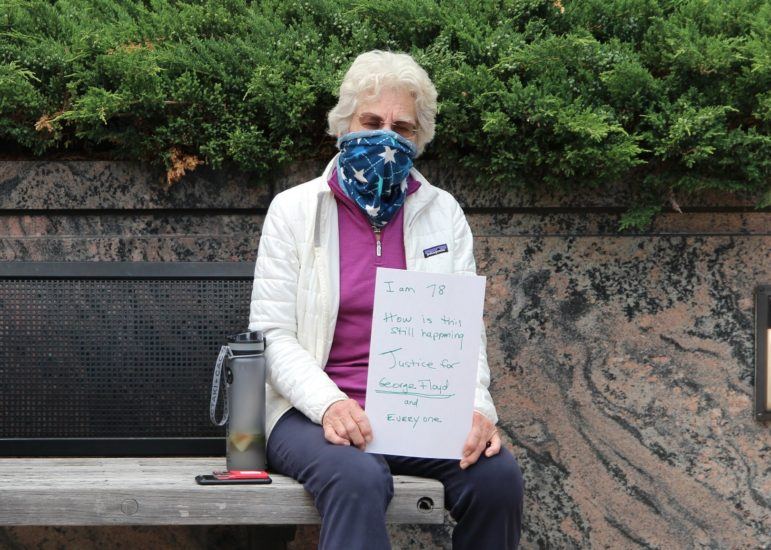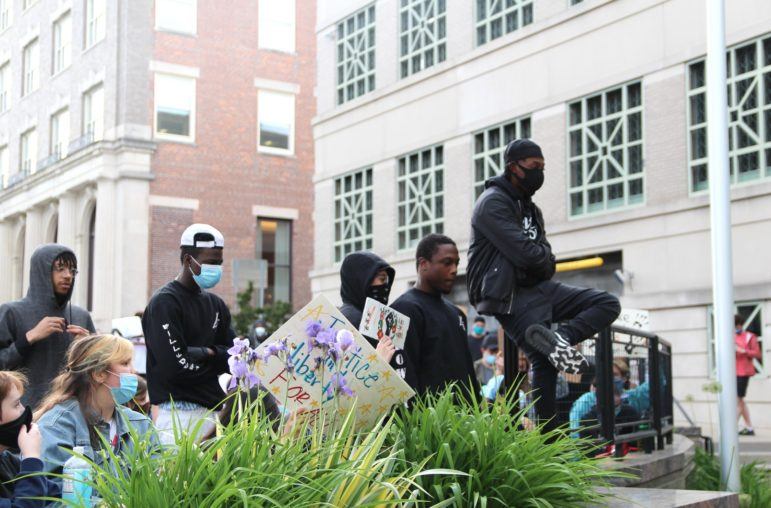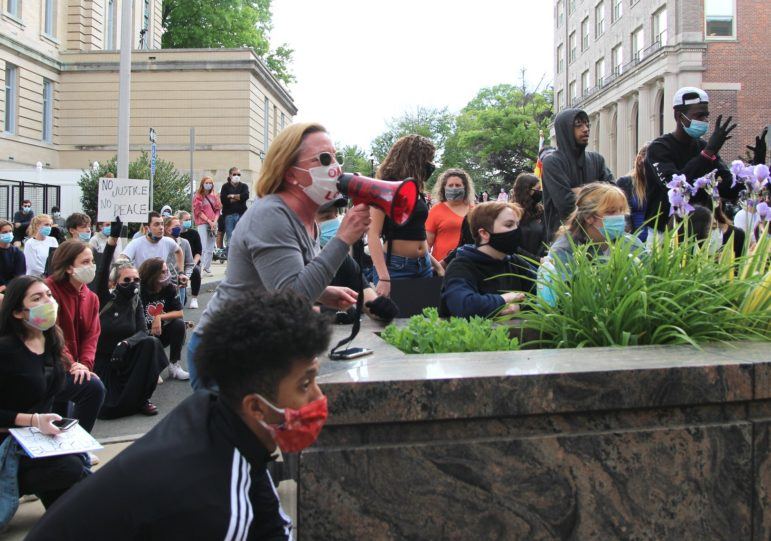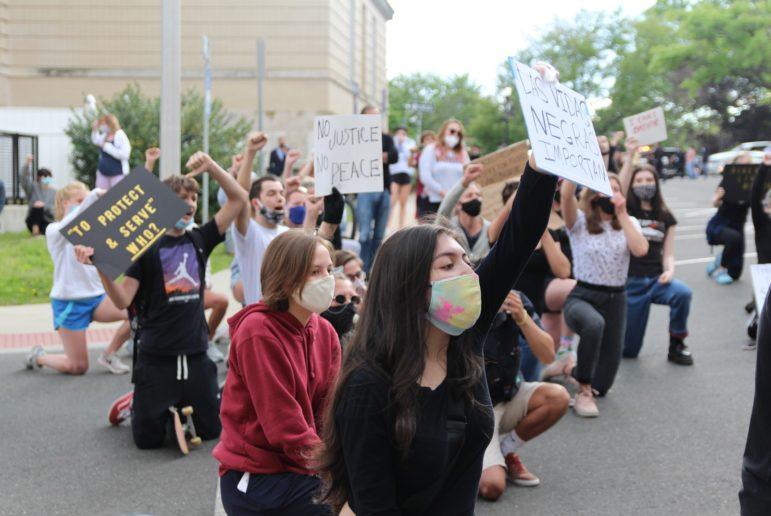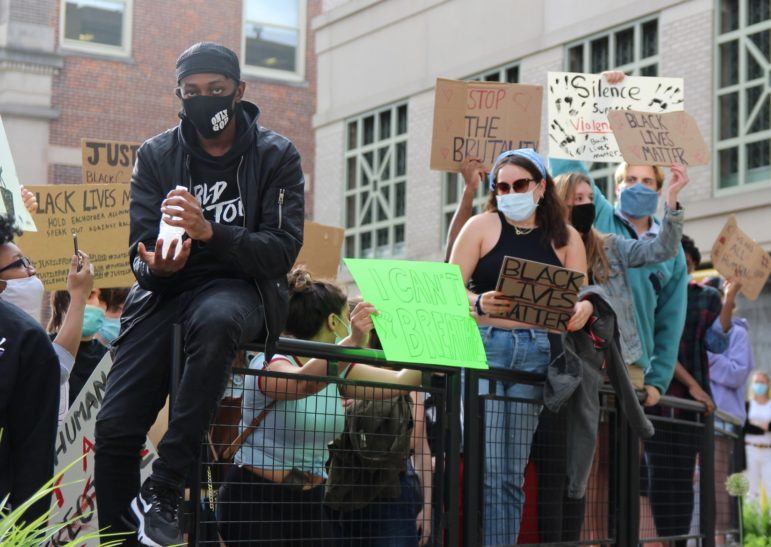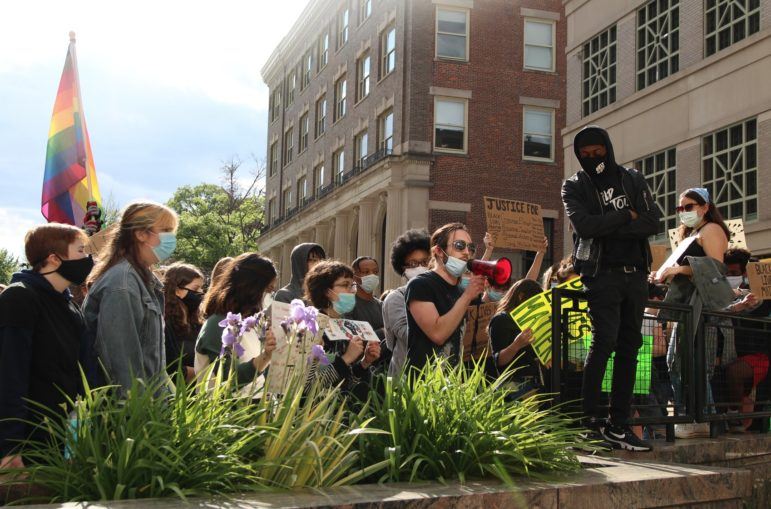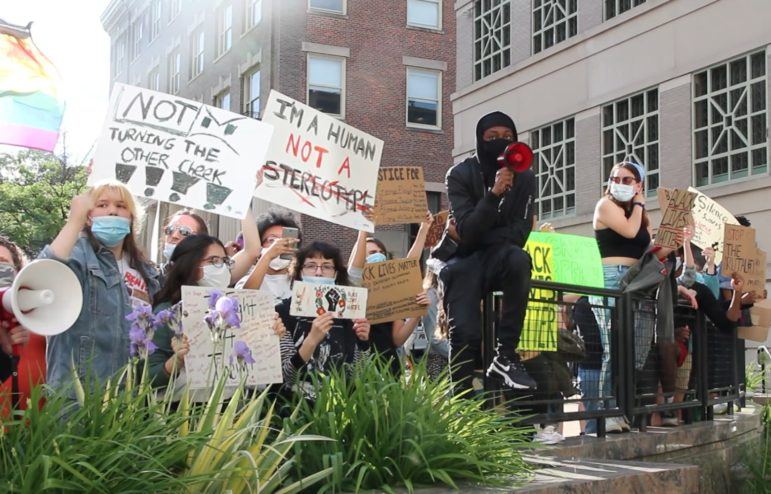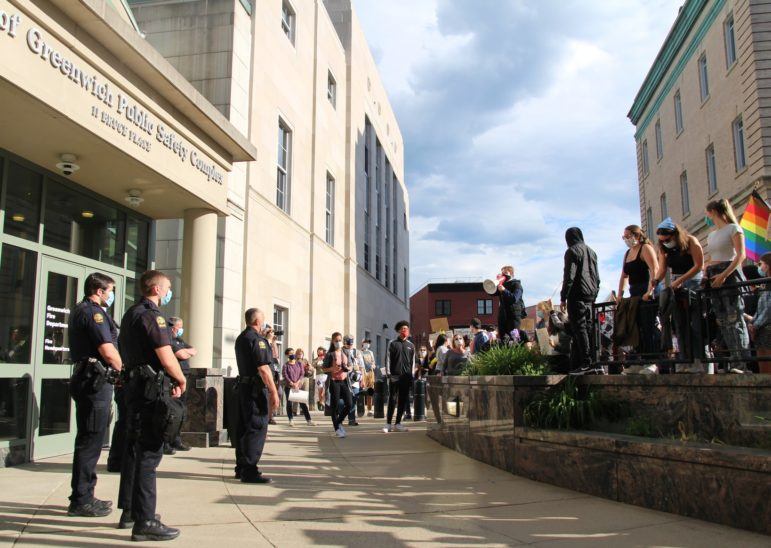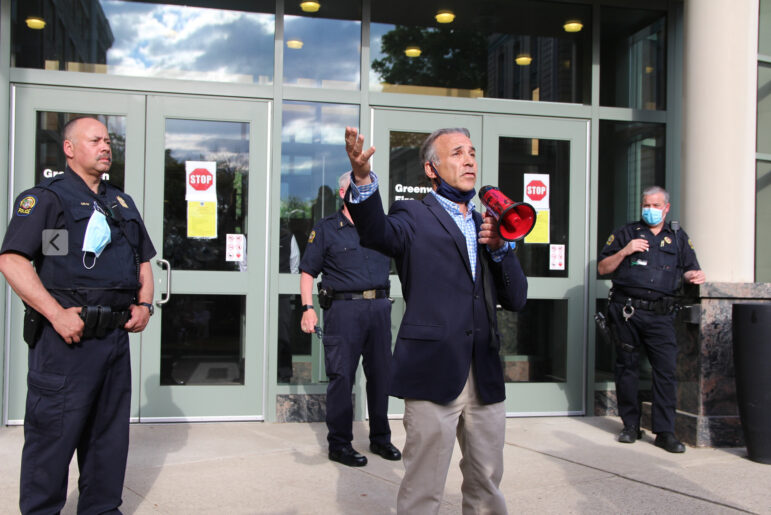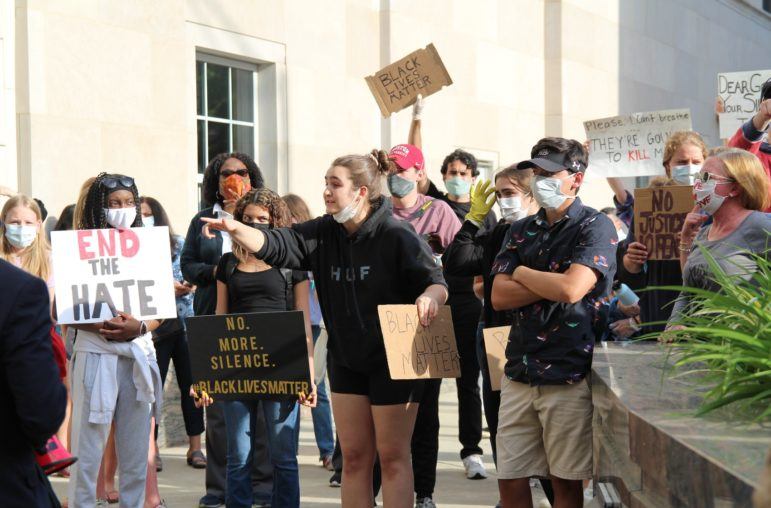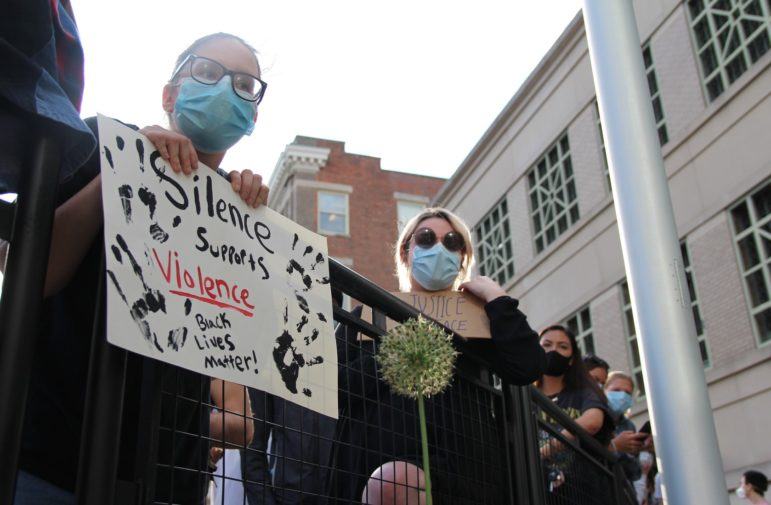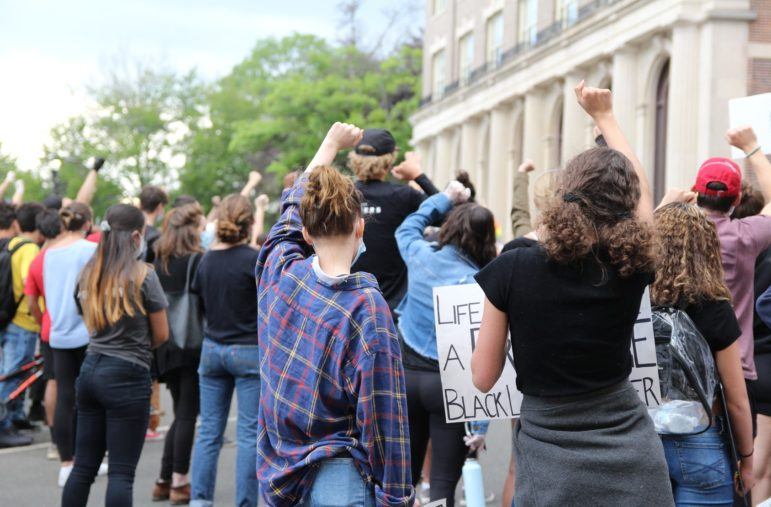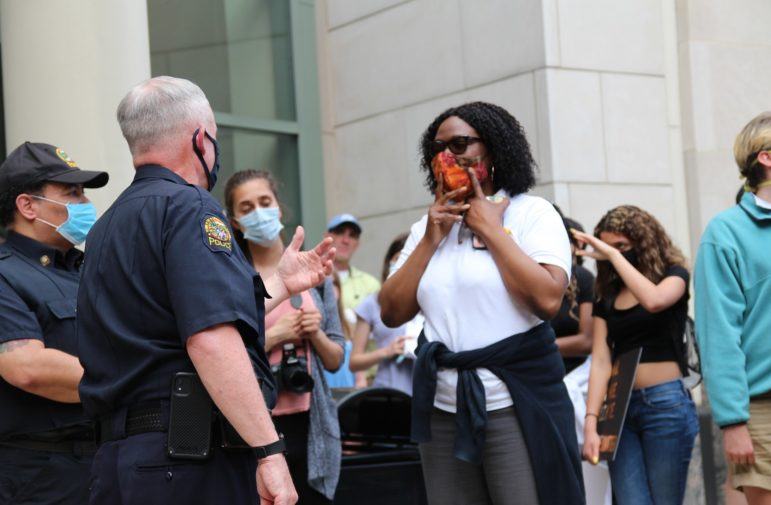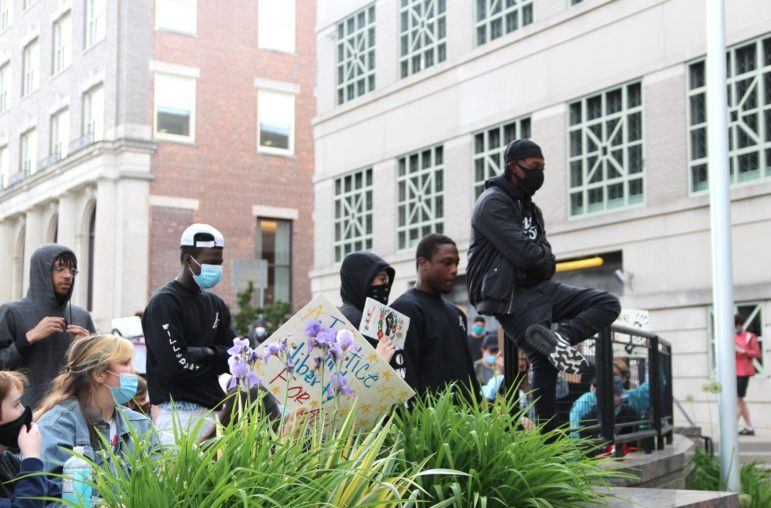Monday June 1 was supposed to be the first day of Pride Month, but calls for justice triggered by the death of George Floyd in Minneapolis took center stage.
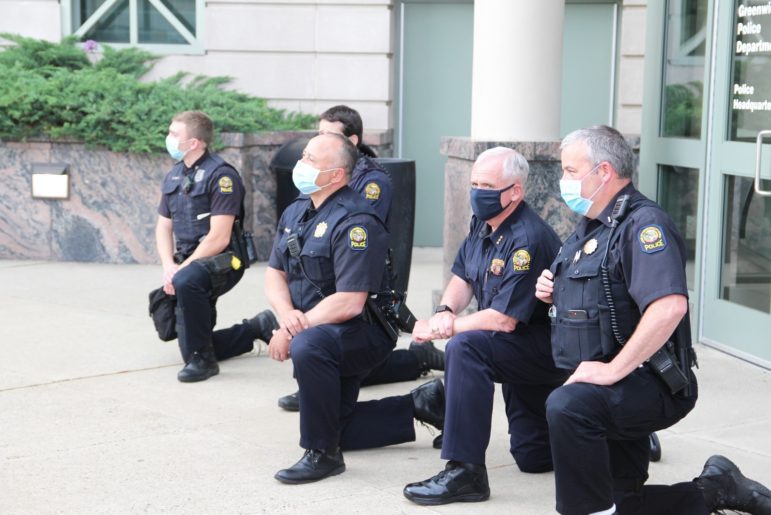
On May 25 Mr. Floyd was pinned face down on the ground, in handcuffs, by a white police officer who pressed his knee against Floyd’s neck for more than eight minutes.
In the midst of a deadly pandemic, protests crisscrossed the country over a tumultuous weekend and into Monday, often erupting into violence and looting.
On Monday, an independent autopsy ordered by Floyd’s family determined that his death was a homicide.
Also on Monday, President Trump pledged to summon the military to quell protests. On a call to Governors, Trump advised them to “dominate.”
In Greenwich, a crowd of about 150 people, including many college students, gathered outside the public safety complex with handmade signs saying ‘Black Lives Matter’ and ‘I Can’t Breathe.’
Around 6:00pm, uniformed officers, including Chief Jim Heavey and Captain Kraig Gray, took a knee outside police headquarters, explaining that they too were outraged by the death of Mr. Floyd.
A block away on Greenwich Avenue restaurant patrons enjoyed dinner al fresco and volunteers planted flowers while workers boarded up the Apple Store ostensibly in anticipation of looting.
Captain Gray and Chief Heavey attempted to have a dialogue with protesters, but it wasn’t until after many attempts that the crowd quieted to listen.
Several individual protesters relayed experiences in which they felt they’d been treated unfairly due to their race.
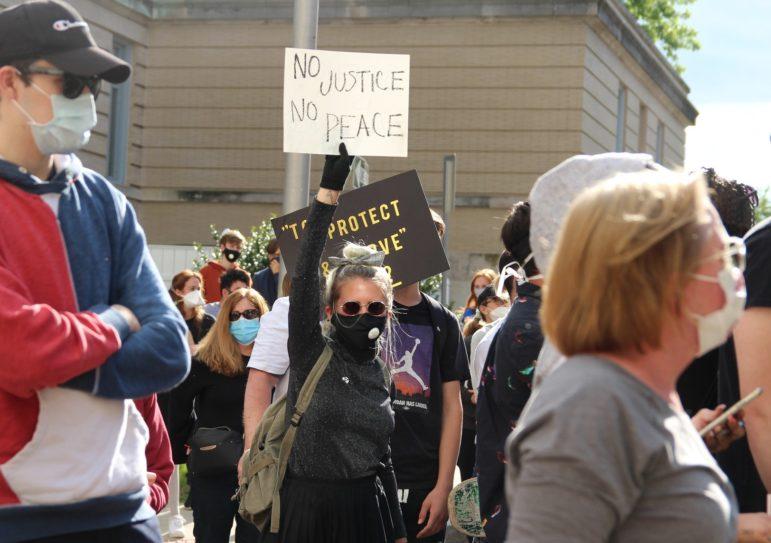
A young woman said she’d called police after an altercation with her boyfriend, but she was arrested, not her boyfriend who was white. Black men said they had been repeatedly pulled over by police in Greenwich despite not having broken a law.
Shannon Kennedy said she’d attended the Citizens Police Academy around the time Eric Garner died after being placed in a choke hold by NYPD. She said that in the class police justified the use of force.
“They said it in front of every single one of us and I was sickened by it,” she said.
Kennedy said she intentionally had not collected her certificate for completing the course.
“I was so disturbed by it, I walked away. I never picked up my certificate and I carried that every single day. How do you feel about that and what you see here today?” she asked the police.
“Other than the action of walking away, how did you communicate that?” Heavey asked her.
“Don’t put the blame on her,” protesters shouted.
“I voiced my opinion in class. What else do you want me to do? Don’t put the blame on me,” Kennedy said. “Do you think it was justified, choking him until he was dead?”
“Eight f___ minutes. Doing nothing,” a protester shouted, referring to Mr. Floyd.
“They were wrong,” Captain Gray said. “It’s a universal disgust. Everyone in Greenwich Police Dept is disgusted. Your emotions are real. I respect that.”
“Why do you need five cop cars to give someone a ticket?” someone asked to a round of cheers.
“Abuse of power,” someone shouted.
“We’re scared of you because you don’t know how to act,” someone shouted.
“You’re supposed to protect us,” another shouted.
Still, the police tried to answer questions but were drowned out.
Protesters demanded that the entire police department leave the building and face them.
“Our officers aren’t all in the building. They’re out serving. They’re on the road,” Chief Heavey explained.
“Bring them out,” the crowd shouted.
“We want action,” someone shouted.
The crowd erupted in a chant, “No justice, no peace.”
“It’s a corrupt system. If you don’t say anything, you’re just as bad,” a protester shouted.
Protesters repeated chants about voting out the police chief. Then, learning the Chief is not elected, they chanted, “Where’s Fred?”
When First Selectman Fred Camillo, who serves as the civilian oversight of the police department, emerged from the building, protesters loaned him their megaphone.
“For those who don’t live in Greenwich, welcome to Greenwich. We hope you’ll come back,” Camillo started. The crowd erupted.
“I was born and raised in this town. We never had any issues here,” he said. The crowd erupted again.
“If you have any complaints at all, the police respond. I’m here to respond. I’ll give you my phone and email. I do that all the time,” Camillo continued. “We appreciate people coming out and sharing their views. And when we see an injustice like we saw in Minnesota, you should be here and expressing your views. But that in no way reflects on this police department, which goes above and beyond.”
Camillo tried to explain that the building the protesters were pointing to was a parking garage, and that after 5pm the building is mostly empty, and officers are on duty in patrol cars in various parts of town.
“We’re here and happy to listen to constructive dialogue,” he added. “We’re happy you came out.”
Camillo said he’d driven to New Hampshire when he was younger and been ticketed three times in a short period of time by police who he said couldn’t pronounce his name.
His story failed to quiet the crowd.
“I’m inviting you to come and talk with me. I need to know where the issues are. If there’s an issue we need to deal with it right away,” Camillo said to the crowd. “These men and women put their lives on the line for every single person here. If you need a police officer here, you would thank God you have these men and women here to protect you.”
When protesters shouted police were “clowns,” Camillo said, “That’s the type of disrespect that we’re talking about. They’re not clowns. They’re members of this community, and they’re here to protect everybody.”
“Were you unaware of systemic racism until today?” one protester asked Camillo.
“Mam, I grew up very blue collar. Don’t try to throw that one percent at me, okay?” he replied. The crowd erupted.
“It’s about race,” someone shouted.
One protester quieted the crowd. “What I’m saying is I’m asking for some trust. I’m asking you to take my word when I tell you my black brother is telling you, to your face, that he doesn’t trust police, period,” he explained. “He’s not pulling it out of nowhere…How are you going to single handedly undo 240 years of oppression?”
“One person at a time,” Heavey said. “Every positive interaction with an officer. We have to build on the good stuff and fix the bad.”
“I’ve been shouted over,” Captain Gray said after trying to speak several times. The crowd quieted. “I cannot go back in time. I cannot talk about things take place outside Greenwich. What I can talk about is what I can control, and as commander of the patrol division, we do our best. I hold them accountable for their actions. What I say, they do. What took place with George Floyd was horrific.”
“Social justice matters to the police, just as it matters to the community,” Heavey said. “We, as an organization are always trying to learn about our biases. We had the Anti Defamation League and other agencies in here and are always trying to learn about biases.”
“I’ve heard some of you talk about incidents in the past where you felt you were treated wrongfully because of your race, your color or where you were,” Heavey said. “There is a process for you to make a complaint to the commander of the patrol division. We investigate it. We discipline officers who don’t act rightfully. We respect the First Amendment and your right to say important things that matter to you. We’re not against you. We’re here to keep the peace.”
After about an hour of back and forth between the Chief, Patrol Commander and First Selectman, the protesters began to disperse from the public safety complex entrance. From there they gathered in a circle closer to the Avenue for some more chants before breaking up.
